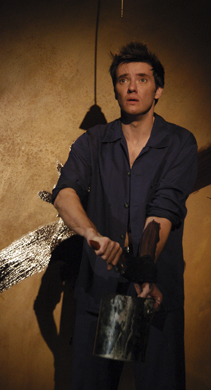
|
HAMLET
|
|
|
|
HAMLET
Troupe’s Take on “Hamlet” is Fascinating and Fresh By Mark Lowry / Star-Telegram Too often, it seems, theaters tackle Hamlet only for the challenge of it, rather than considering the timeless relevance of its story and characters, and emotion is lost in the shuffle. It’s as if directors and performers don’t heed Hamlet’s advice to Lucianus: “The purpose of playing is to hold the mirror up to nature.” Thankfully, the reflection in the Dallas Theater Center’s mirror is worth looking at. Director Richard Hamburger’s Hamlet accomplishes what it sets out to do. It surprises, it startles, it fascinates and, most importantly, it makes us think about a script we’ve seen countless times on stage and screen. More than most plays, Hamlet depends on the intuition of its cast, especially the lead actor. Hamburger’s ensemble is top-notch, but he deserves much of the credit. He has not only cut the script to just under three hours but rearranged and reimagined it while retaining the intent. This staging, set just before World War I, begins with the play’s second scene. So later, Horatio leads Hamlet to the Ghost that he can only mention as having seen. (Hamburger wisely posts the Ghost, Michael Kevin, onstage from the beginning, sitting like Grant posing for a portrait, behind the glass of Klara Zieglerova’s towering but spare stainless-steel-and-glass set.) Hamlet (Jason Butler Harner), portrayed as a musician and artist, is playing a grand piano while Claudius (Shawn Elliot), Gertrude (Caitlin O’Connell) and others discuss Hamlet’s father’s death. Later, Hamlet plays the incidental music for The Mousetrap. And in the “To be or not to be” speech, which happens earlier than usual, Hamlet sloshes and splatters paint on a giant canvas with Pollockian fervor. Hamlet as artist adds another level of sensitivity and emotion and provides a fresh backdrop for his intense passion and motivations. Harner effortlessly springboards from this idea to produce an effective mix of edginess and vulnerability that’s shadowed by intellect. It’s clear that he’s in favor of the “to be” segment of his famous question. The Fortinbras factor is slightly underplayed in the familial politics, but it’s still there, reminding that even when our own feelings are center stage, there’s always something more urgent looming. There are too many other terrific portrayals here to mention (Ross Bickell’s Polonius and Gravedigger stand out, though.) The one quibble is with Elliot, who may have been overtrained in Shakespeare. His Claudius belongs in a more traditional staging of Hamlet and sticks out among a cast that has, with Hamburger’s guidance, found fresh inroads to a masterpiece. |
|
© Richard Hamburger, Theater Director Site design and maintenance by Amy Lacy.
|



